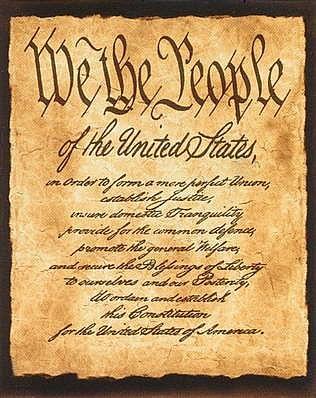
The urgent need for order to replace turmoil was most evident to those delegates of the thirteen states who assembled to establish a government that could fulfill the purpose of the Declaration of Independence. The delegates knew that agreements to form a government with sufficient power to control crime could only be obtained if the delegates were in an environment where there would not be posturing for public clamor. They agreed to conduct the discussions behind closed doors.
Two of the main issues to be addressed in the formations of the government were the differences in state size and sectional culture. The size discrepancy was solved by the agreement to have two legislative assemblies, but the sectional culture issue was much more difficult. The northern and southern states were irreconcilable on the issue of slavery and it was finally agreed that the issue would not be on the table for discussion. It was somewhat of an agreement that the issue would not be mentioned-for without that concession the southern states refused to negotiate.
We do not know all that was said behind closed doors of the convention but in 1790, after the Constitution was in place, the issue was raised again with Benjamin Franklin’s name attached. Those in the anti-slavery section felt the contradiction of the stated purpose of the Revolutionary War as contained in the Declaration of Independence, could not allow for slavery and would in the words of Luther Martin “render us contemptible to every true friend of liberty in the world.” While William Laughton Smith on the opposite side said, “such is the state of agriculture in that country, no white man would perform the tasks required to drain the swamps and clear the land, so that without slaves it must be depopulated...Unless that part was granted they would not [have] come into the union”
The slavery issue was irreconcilable. Thus the word, “slavery” was carefully avoided in writing the Constitution. Article IV Section 2 contains, “… [No Person held to Service or Labour in one State, under the Laws thereof, escaping into another, shall in Consequence of any Law or Regulation therein, be discharged from such Service or Labour, but shall be delivered up on Claim of the Party to whom such Service or Labor may be due].” The words, “service or labour” were used instead of the word slave.
In his urging for ratification, Charles Pinckney would say, “In short, considering all circumstances, we have made the best terms for the security of this species of property it was in our power to make.” The term property was used in place of slaves all the way down to 1865.
When the delegates were discussing the apportionment for the legislature in Article I section 2, and they referred to those who would be counted for that purpose; they excluded “Indians not taxed”, and included free persons, indentured servants, and “three fifths of all other persons” (meaning slaves).
In the same Article, section 9, the issue of regulating the slave trade was written while avoiding the word, “The Migration or Importation of such persons as any of the States now existing shall think proper to admit, shall not be prohibited by the Congress prior to the Year one thousand eight hundred and eight, but Tax or duty may be imposed on such Importation not exceeding ten dollars for each Person.” Here the word “person” is substituted for slave.
The northern population used the word “slavery” which continued to anger the southern states to the point that they finally determined to do what they had threatened in the first place – to withdraw from the union. Finally after the destruction of 600,000 people and a great deal of property damage, the word “slavery” was added to the Constitution in Amendment XIII: “Neither slavery nor involuntary servitude, except as a punishment for crime where the party shall have been duly convicted, shall exist within the United States, or anyplace subject to their jurisdiction.”